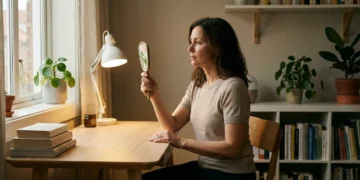1. Identify your triggers.
The first step to dealing with anxiety is to identify your triggers. What are the things that typically make you feel anxious? Once you know what your triggers are, you can start to develop strategies for coping with them.
2. Avoid your triggers.
If possible, try to avoid your triggers. However, if you cannot avoid your triggers, develop strategies for coping with them in a healthy way.
3. Practice relaxation
Relaxation techniques such as deep breathing, meditation, and yoga can be very effective for reducing anxiety. There are many different relaxation techniques available, so find one that works for you and practice it regularly.
4. Get regular exercise.
Exercise is a great way to reduce stress and anxiety. Aim for at least 30 minutes of moderate-intensity exercise most days of the week.
5. Eat a healthy diet.
Eating a healthy diet can help to improve your mood and energy levels, which can make it easier to cope with anxiety. Avoid processed foods, sugary drinks, and excessive caffeine and alcohol.
6. Get nough sleep.
When you are well-rested, you are better able to cope with stress and anxiety. Aim for 7-8 hours of sleep per night.
7. Talk to someone you trust.
Talking to a friend, family member, therapist, or other trusted person can help you to feel better and develop coping strategies. If you are struggling to cope with anxiety on your own, please reach out for help.
Here are some additional tips for dealing with anxiety:
- Challenge your negative thoughts. Anxiety often involves negative thoughts about yourself, the world, and the future. When you have an anxious thought, ask yourself if it is realistic or helpful. If not, challenge the thought and replace it with a more realistic and positive thought.
- Focus on the present moment. When you are feeling anxious, it is easy to get caught up in worrying about the future. However, this will only make your anxiety worse. Try to focus on the present moment and what you can control.
- Accept uncertainty. One of the things that can make anxiety worse is the need for certainty. However, life is uncertain. Accepting uncertainty can help to reduce your anxiety.
- Be kind to yourself. It is important to be kind to yourself when you are struggling with anxiety. Remember that you are not alone and that there are things you can do to cope.
If you are struggling with anxiety, please reach out for help. There are many resources available to you, including therapists, support groups, and online resources.





















